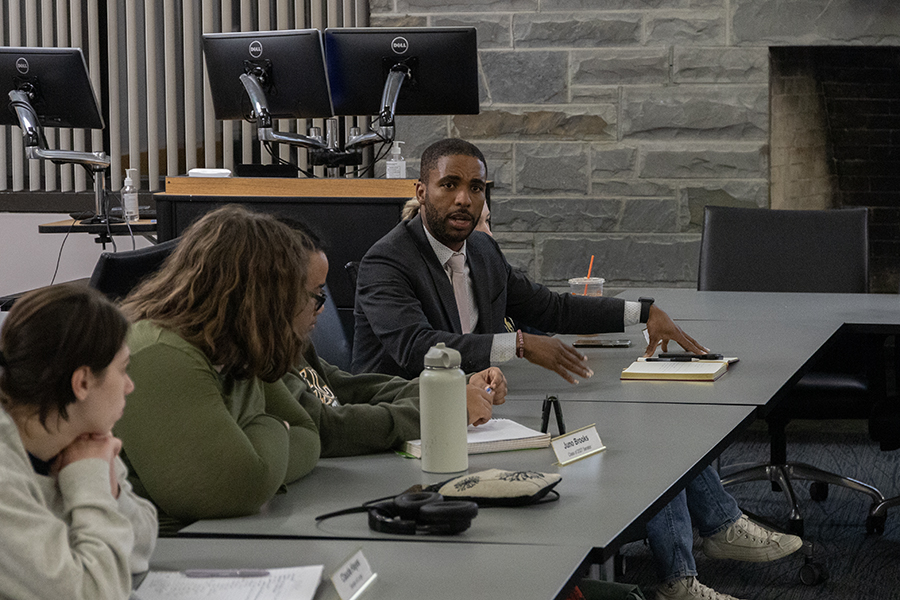Stanley Bazile, vice president for Student Affairs and Campus Life, spoke with the Ithaca College Student Governance Council on Oct. 28 about suicide awareness.
The council asked Bazile questions about the purpose of the Office of Student Affairs and Campus Life and student civil disobedience on campus. The SGC also heard from Samantha Shaffer, associate director for Student Conduct and Community Standards, about proposed changes to the college’s Student Code of Conduct.
Suicide awareness
Bazile spoke about sophomore Kit Kelly, a television and digital media production major, who died by suicide Oct. 15. They worked on campus in the Towers Marketplace and were an assistant director on the Ithaca television show “Game Over.”
Bazile said Kelly did not articulate that they were thinking of committing suicide to anybody on campus, that he knows of. He said Kelly is a reminder to be aware of the subtle nonverbal signs of someone who is struggling with their mental health.
“[Be] very conscious when we’re around people,” Bazile said. “Not necessarily the words that people say, but the change in behavior, change in mannerisms, the things that they don’t say that could signal that they’re hurting.”
Bazile said that the college needs to be aware that a student could be experiencing suicidal thoughts at any moment and be prepared to save them from suicidal ideation. He shared an experience he had at a previous institution where a student leader with a high–paying job lined up, committed suicide one week before graduating.
“I remember getting the call and said, ‘What name did you say? There’s no way,’” Bazile said. “Unbeknownst to us, this individual was suffering in the darkness.”
Bazile said he is examining if there are enough resources for mental health at the college and wants to train faculty to identify the signs of suicidal ideation. He said it is important to lean into vulnerability and not suffer in silence.
“Vulnerability is strength,” Bazile said. “I lost a student and I hugged my kids so tight that night.”
Questions for the Office of Student Affairs and Campus Life
First-year student Giulia Gennari, senator for the School of Health Sciences and Human Performance, asked Bazile what the Office of Student Affairs and Campus Life does.
“I know you are the vice president of Student Affairs and Campus Life, but I honestly don’t know what that really means,” Gennari said. “How would you describe it in a simple way to everyone?”
Bazile said most of the meaningful experiences students have outside of the classroom falls under the purview of the Office of Student Affairs and Campus Life. He said students spend most of the day outside of the classroom, meaning the office significantly influences the student experience.
“When people talk about, ‘Oh, I love IC,’ that’s a direct reflection of the work we did,” Bazile said. “They say, ‘I hate IC,’ that’s … us as well.”
Juno Brooks, Class of 2027 senator, said he knows students who have expressed interest in political activism, but they were worried about getting pushback from administration. Students are allowed to peacefully assemble on campus as long as they do not violate the rules of the Policy Manual. He asked Bazile what the Office of Student Affairs and Campus Life’s stance on student activism is.
“Students have expressed interest in [political activism] but have gotten a lot of pushback, no matter what side of the political spectrum they fall on,” Brooks said. “I would like you to talk more about what … the stance [the Office of Student Affairs and Campus Life] has on political activism.”
Bazile said that when he was in college he led a campus protest against his school’s meal plan where he had to balance pushing against the status quo without disrupting other student’s education. He said higher education is supposed to be a space where students can be intellectually uncomfortable while still feeling safe.
“You can be civil[ly] disobedient and still allow [students] to go to class,” Bazile said. “When you go, ‘I’m going to be civil disobedient, and … I want to stop everything that’s happen[ing], at that point, you’re now violating the principles of higher education.”
Proposed changes to the Student Code of Conduct
Samantha Shaffer, associate director in the Office of Student Conduct and Community Standards, has been working on changes to the Code of Conduct and the current conduct process. She said she wants to get rid of a discrepancy within the conduct process, between the Student Code of Conduct and the Residential Life Rules and Regulations.
“If you’re standing in Talcott [Hall] and you’re under 21 and have an open can of beer you are going to follow the [Residential Life Rules and Regulations] process,” Shaffer said. “[If] you have that same can of beer and you walk outside of Talcott … you go through the [Student Code of Conduct] process.”
A student charged under the Student Code of Conduct has an administrative hearing, a conduct review board hearing and the option to appeal before receiving their final outcome. A student charged under the Residential Life Rules and Regulations only receives an administrative hearing before receiving their final outcome.
“The Rules and Regulations [say] … you’re going to go to what’s called an administrative hearing,” Shaffer said. “Which is a meeting … to have a conversation about what happened and determine whether or not you violated policy. That’s it. Whatever [the hearing officer] decides is final.”
Low level and first time violations will be met with a policy review meeting in Shaffer’s proposed changes to the conduct process. All other cases will be met with an incident resolution meeting, followed by the students’ choice between an administrative hearing with one person or a conduct review board hearing with three people and the option to appeal the outcome of the hearing. She said the changes will support the office’s goals of maintaining a supportive student conduct process.
Shaffer said the proposed changes will be put in place at the start of Spring 2025 if they are approved before the end of Fall 2024. She said if the proposed changes are not approved in time they will be put into place at the start of Fall 2025.
The SGC is the sole representative body for the Ithaca College student community. The SGC can be contacted at [email protected].








